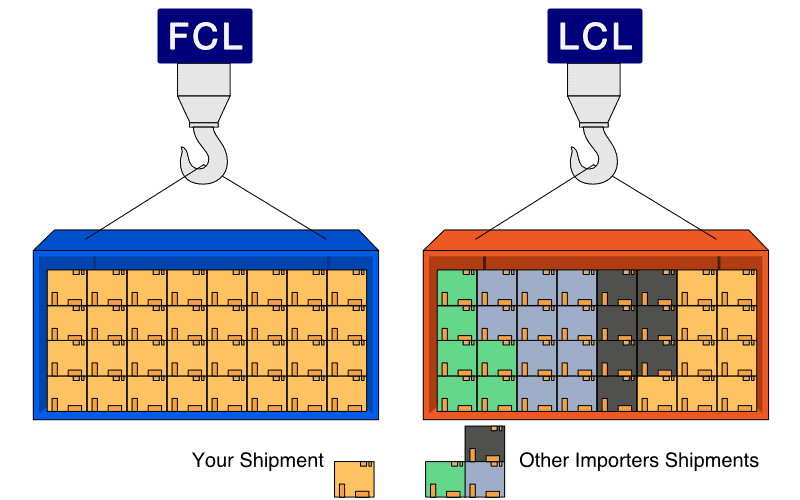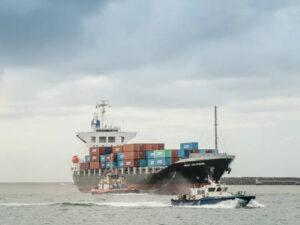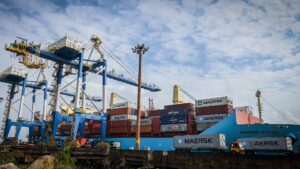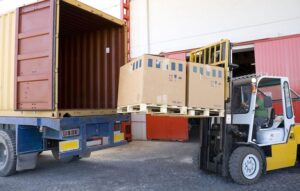
Navigating international shipping can be challenging, especially for businesses that do not require a full container for their shipments. Less-than-Container Load (LCL) shipping is a cost-effective solution for companies with smaller volumes of cargo. This comprehensive guide covers everything you need to know about LCL shipping, from its basic meaning to rates, quotes, and essential logistics.
Definition & Basics of LCL Shipping
What is LCL (Less-than-Container Load) in Shipping?
LCL, or Less-than-Container Load, refers to a shipping method where multiple shippers share space within a single container. This allows each business to pay only for the space they use rather than the cost of an entire container, making it ideal for smaller shipments. LCL is primarily associated with sea freight.
The Difference Bertween FCL and LCL
While LCL allows multiple shippers to consolidate goods in a single container, Full Container Load (FCL) is reserved for one shipment that fills the container. FCL is often quicker since it doesn’t require consolidation or deconsolidation and is generally less exposed to damage risks, as it doesn’t mix with other cargo.
When is LCL Beneficial for Businesses over FCL?
LCL is advantageous for small to medium-sized businesses (SMEs) that don’t have enough cargo to fill a container or need a cost-effective way to ship smaller loads. It offers flexibility and affordability, especially when shipment volume is inconsistent.

LCL Ocean Freight Operations
What is Involved in LCL Ocean Freight?
LCL ocean freight involves a freight forwarder who consolidates shipments from multiple businesses into a single container. Each business’s cargo is kept separate but combined in one container to reduce costs.
How Does Cargo Consolidation Work in LCL?
In LCL, cargo from different shippers is consolidated at a logistics hub or warehouse. It’s sorted, packed into a container, and then shipped. Upon arrival at the destination port, the container is deconsolidated, and individual shipments are dispatched to their respective destinations.
What are the Typical Logistics from Origin to Destination in LCL Shipments?
From the origin port, LCL shipments go through the processes of consolidation, transportation, customs clearance, and finally deconsolidation at the destination port. Each step is managed by a freight consolidator who oversees the entire logistics process, ensuring all shipments are delivered safely and on time.

Advantages & Challenges of LCL Shipping
How Does LCL Benefit SMEs and Businesses with Smaller Shipments?
LCL shipping is highly beneficial for SMEs due to its flexibility and affordability. It allows businesses to ship smaller loads without incurring the costs of an entire container. Additionally, it opens up international markets by making logistics more accessible to companies with lower shipping volumes.
Challenges Businesses Face with LCL Shipping
While LCL offers flexibility, it comes with challenges:
- Longer Shipping Times: Consolidation and deconsolidation processes add time to delivery.
- Risk of Damage: Mixed cargo within a shared container can lead to higher chances of damage.
- Customs Delays: Consolidated shipments may face delays in customs processing, particularly if one item in the container encounters regulatory issues.
Pricing & Rates for LCL Shipping
How are LCL Rates Determined?
LCL rates are generally calculated based on volume (cubic meters) and weight, with consideration for the destination. Most providers use the higher value between volume and weight for pricing, which ensures larger shipments or those heavier per volume are priced accordingly.
Factors Influence LCL Shipping Costs
Several factors affect LCL costs:
- Distance and Destination: Longer distances and remote destinations typically have higher fees.
- Customs and Handling Fees: Additional charges like terminal handling fees and customs duties may apply.
- Consolidation Fees: Since multiple shipments are consolidated, fees associated with handling each shipment may increase overall costs.
Do Shipping Rates Vary with Volume? What is the Pricing Structure?
Yes, rates vary with volume. The pricing structure often charges per cubic meter, with minimum charges for even small shipments.
Estimated Costs for LCL Shipping
| Factor | Rate Based on Volume (m³) | Rate Based on Weight (kg) | Additional Fees |
| Volume | $50/m³ | Terminal Handling Fees | |
| Weight | $2/kg | Customs Fees | |
| Destination | Rates vary | Rates vary | Consolidation Fees |
Quotes & Cost Estimation for LCL Shipping
How Do Businesses Obtain LCL Shipping Quotes?
LCL quotes can be obtained through freight forwarders, online shipping platforms, or directly from logistics companies. Businesses need to provide information on cargo size, weight, destination, and any special handling needs.
What Factors Should Businesses Consider in Quotes?
When reviewing LCL quotes, businesses should consider:
- Transit Time: Faster options may be available at a premium cost.
- Additional Fees: Check for any extra fees, like terminal handling charges and customs fees.
- Service Quality: Choose a reputable provider to ensure secure and timely deliveries.
LCL Shipping Logistics & Transit Times
What are the General Transit Times for LCL Shipments?
LCL shipments often take longer than FCL due to the need for consolidation and deconsolidation. The exact time depends on the shipping lane, but generally, LCL transit times are slightly extended compared to FCL.
How Do Port Congestion, Weather, and Customs Affect Delivery Time?
Several external factors influence delivery times:
- Port Congestion: High-volume ports may experience delays.
- Weather: Adverse conditions can affect sea transit.
- Customs: Delays in customs processing, especially for mixed cargo, can extend overall delivery time.
What is the Role of Freight Agents in the Logistics Process?
Freight agents manage the logistics of combining shipments from various shippers into one container, ensuring that each load is carefully handled from origin to destination.
Documentation & Regulations for LCL
What Documents are Necessary in LCL Shipping?
Common documents for LCL shipping include:
- Bill of Lading: Details the shipment, issued by the carrier.
- Packing List: Itemizes the goods in the shipment.
- Commercial Invoice: Required for customs, detailing goods and their value.
How Do Regulations Vary Across Regions?
Regulations may differ by country, with some regions requiring additional certifications or compliance standards. Freight forwarders often assist with ensuring documentation aligns with destination country requirements. For example, LCL shipments typically require SIRIM import permit for certain regulated goods entering Malaysia.

Incoterms & LCL Shipping Terms
How Do Incoterms like FOB and CIF Apply to LCL?
Incoterms, such as Free On Board (FOB) and Cost Insurance Freight (CIF), help define the responsibilities between shippers and consignees. FOB means the shipper is responsible until the cargo reaches the port, while CIF includes insurance coverage until delivery.
What Responsibilities Do These Terms Assign to Shippers and Consignees?
Incoterms determine who covers certain costs and risks, clarifying whether the shipper or receiver manages insurance, transport, and customs duties at each step.
Comparing LCL and FCL for Businesses
When Should Businesses Choose LCL over FCL?
LCL is ideal for businesses with smaller shipment sizes that don’t justify a full container, especially when flexibility and cost savings are priorities.
Are Certain Industries More Suited to LCL Shipping?
Industries with varying shipment volumes, such as retail, e-commerce, and small-scale manufacturing, often benefit from the flexibility of LCL, which allows for efficient international distribution without overcommitting on container space.
Learn more about the types of common goods for LCL shipments here.
Conclusion
LCL shipping is a versatile and economical option for businesses with smaller shipment volumes, especially for those looking to optimize logistics costs internationally. Understanding the nuances of LCL, from pricing to documentation, helps businesses make informed shipping decisions that align with their goals and budgets. By partnering with a reliable freight consolidator and staying aware of potential challenges, companies can successfully navigate the complexities of LCL shipping and expand their reach in global markets.
Looking for a Reliable LCL Shipping Solution?
Our LCL service is designed to provide cost-effective and flexible shipping options for businesses with smaller shipments. Whether you’re a small business looking to scale or a larger enterprise optimizing international logistics, our LCL solutions help streamline your shipping process with reliable transit times, transparent pricing, and comprehensive support.




